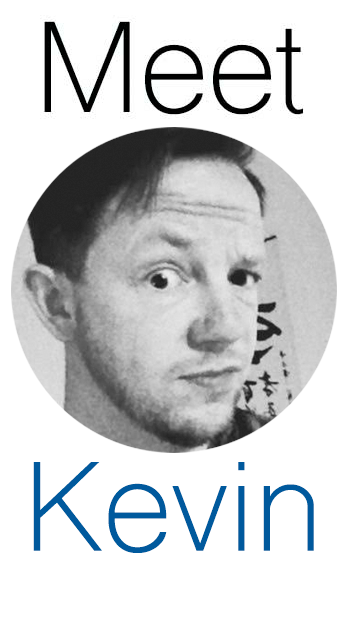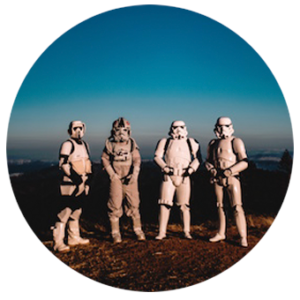
Welcome to the seventh installment of our series, Meet the Freelance Writer!
Here, you’ll meet a diverse range of individuals who have carved out a place in the world of full-time freelance writing. You’ll learn all manner of insights about the life of a freelance writer, such as how to start out, what a “typical day” day looks like, and all those other niggling questions we know you have. If you’re curious about freelance writing as a career, or are looking for some advice on how to improve your freelancing business, this is the series for you.
Today, we’ll meet freelance writer Kevin Stewart.

1. Hi Kevin! Can you tell us a bit about yourself and your freelance writing?
Hello! My name is Kevin Stewart. I’m 34 years old, I’m English and I live in the North East of England. I work from home as a full-time freelance writer and editor – which I’ve been doing since 2013.
Writing is something I fell into completely by accident. I’d been made redundant from a previous job and was struggling to find another job – largely thanks to the recession, I like to tell myself – so I kept myself occupied with some voluntary writing. That turned into paid work quite quickly and I decided it was what I wanted to do as a career choice.
Most (but not all) of my writing focuses on pop culture – I’ve pretty much covered the entire pop culture spectrum – and I also manage a fairly large team of similar writers as an editor.
2. Can you run us through what a “typical” day looks like for you as a freelancer?
I won’t lie to you – I’m not one for early mornings! Fortunately, being a freelance writer means I can work any time I want, so I’m rarely up at the crack of dawn. I tend to rise at around 9am most days, at which point I’ll have a cup of tea and check my emails before I get stuck into my work.
Being an editor, I’ll usually check to see what the writers I oversee have been up to since I last logged into my editor account. I’ll accept or reject any article titles that have been pitched, then read through any articles that have been submitted and either have them scheduled for publishing or send them back to the writer so he or she can make any necessary amendments.
When I get finished doing that is anybody’s guess! It depends entirely on how active my writers have been since the previous day. Once I’m done, however, I’ll get on with my own writing work – whatever that happens to be that day! I have a few regular gigs, so I’m always kept occupied, put it that way!
There’s no timescale for my own writing, though. Unless I have plans on an evening, I’ll spread my work over the course of a full day, which will often take me up to very late at night. At that point, I’ll always look at freelance job listings to see if anything new catches my attention before I head to bed.

3. You have over 1000 pieces of content to your name on a variety of well-known websites and publications such as College Humor, Screen Rant, and What Culture. How did you go about scoring these writing gigs?
When I first started writing voluntarily for a website, the only published piece I’d ever written was for a recruitment magazine when I worked in the recruitment industry. I used that single piece in my application for the voluntary work, which was enough to get my foot in the door, and it’s gone on from there.
I went on to produce hundreds of articles for the first website I worked for, which gave me a basis on which to find more work, so I just approached more and more websites with the content I’d produced previously. I added more work to my portfolio that way, and it’s a simple method that I’ve continued to use to this day – only with a much heftier portfolio!
I do constantly keep a look out for new opportunities. If anything is of interest to me, I never have any hesitation in contacting the relevant people to show them what I have to offer.
4. Much of your writing focuses on humorous observations or reviews about film, TV, music, comic books, and video games. What is it about this genre of writing that has captivated you so much? What qualities do you think a writer needs to succeed in this genre?
I love film, television and everything else you mentioned in the question. I’m also very opinionated. Combine those facts and you have someone who loves to have his opinions about those topics read by others!
I’m essentially making a living from writing about things I’m interested in. It’s very easy to stay captivated when that’s the case.
In terms of the qualities required in a writer when it comes to succeeding in the genre, I think you’ve got to be every bit as interested as I am in the material. You’ve also got to keep up to date with pop culture to make sure that what you’re writing about is trending and of interest to your potential readers.
Most of all, you have to be creative. There are thousands of articles out there about the various aspects of popular culture. You need to be able to come up with unique titles regularly and, if you can’t do that, at least do something to differentiate your article from other articles on the same topic.

5. You’ve been incredibly successful at writing viral articles, with upwards of 200 million online views for your posts. Is there a particular “formula” you use to help make your content go viral?
I wouldn’t say there’s a specific “formula”, but the most important thing is also the most obvious – I know my audience, so I try to make sure my work is the kind of thing people are going to be interested in reading and sharing. How do I do that? Well it’s back to the aforementioned point about keeping up with what’s trending.
If a big movie trailer just dropped, it’s worth writing about. If a television show’s season opener got people talking, that’s worth writing about too. If Donald Trump has just said something ridiculous, I might even write about him.
Other than that, I just try to make my content interesting and, if possible, unique.
6. With such a busy schedule, how do you manage your time and try to maintain a healthy work/life balance?
My current work with Screen Rant and Comic Book Resources is all managed through project management apps like Frame.io, Asana and Smartsheet. In the past, my work with other websites like DailySuperheroes.com saw me using a similar app in Trello.
All of those utilities prove extremely useful when it comes to having work assigned to me, assigning work to myself, managing my workload and sticking to deadlines.
When it comes to maintaining a healthy work/life balance, I just take it day by day. I’m happy to spread my work over the course of a full day if I have no other plans – and on those kind of days, I’ll mix work with “research” (watching movies and television, which genuinely CAN be considered research in my line of work). If I have plans on an evening, I’ll treat my work like a standard 9-5 job and try to ensure I’m done by 5pm.
When it comes to weekends, I do my very best to treat them as such. I don’t mind doing work on Saturdays and Sundays at all, but I do still try to keep my workload at an amount that I can complete during the Monday-Friday period.
7. You manage a team of 35 other freelance writers at TheRichest.com. What are some common challenges you face as an editor?
I do indeed! It’s a part of my working life that I love. I enjoy reading articles every bit as much as I love writing them, so the work I get sent to proofread and edit is a hobby as much as it is a task.
The biggest challenge for me, as an editor, is keeping writers interested if things don’t go their way. If a writer isn’t pulling in the views – and therefore isn’t pulling in the money in a pay-per-view system – it’s very easy for him or her to stop writing. I try my best to offer advice, encouragement, and incentives whenever I feel any of that is required.
It’s also never nice having to send work back to people if it’s not up to standard. Being told that your work needs to be improved to make it ready for publication isn’t a nice thing to hear/read. Being the one telling them that isn’t something I enjoy. It has to be done, however!

8. What is your standard research process for writing an article?
It really depends on the article topic. In a lot of cases, when an idea for an article comes into my head, all of the information required to write it is already in there. I’m such a big fan of the things that I write about that it comes naturally.
That being said, I do constantly watch, listen, read and play as many movies, television shows, sporting events, music, comics, books, web articles and video games as it takes to give myself more material to work with! It’s hard to complain when the vast majority of the “research” I carry out involves doing things I enjoy.
9. Are there any particularly effective ways you promote an article after you’ve written it?
I post my work on my social media accounts, of course – Twitter and so forth – and the sites I write for post it on their own social media accounts too. If, however, I feel that something needs a push, I’ll find relevant forums, communities and Reddits to post it on as well. Getting your work amongst the people most likely to read it is essential, whether you do it yourself or your readers share it en masse for you.
That being said, I’m of the opinion that good and targeted pieces of writing promote themselves. If an article is good enough, it will find its audience organically.
10. Can you share some downsides of the freelance writing industry you’ve personally experienced?
I’ve definitely found there are far more pros than there are cons to working in the freelance writing industry, but it’s impossible to deny that there are some downsides.
Not meeting people face to face isn’t great. 99% of the people I have worked for and with are hundreds or thousands of miles away from me, working behind a computer screen – that can result in miscommunication and, occasionally, people attempting to take advantage (on more than a few occasions, I’ve had to actively chase up payment, otherwise it simply wouldn’t have come).
There are also always people who will copy your work. Sadly, some websites out there will cut and paste entire articles and use them as their own. It’s happened to me on countless occasions, so vigilance is important. If I find that an article I’ve written appears somewhere it shouldn’t be, I’ll have the legal team of the site I originally wrote the article for on top of it in no time.
11. Have you used our site FreelanceWriting.com before?
I have! I read the articles section quite often, I’ve read some of the e-Books on there, and I browse the job section on a fairly regular basis! I also used the job section to successfully advertise for new writers for The Richest.
12. Finally, what advice would you give to someone trying to break into freelance writing?
Offer yourself up voluntarily. While there are some paying websites that will accept submissions from people with no writing experience, you’ve always got a better chance with a portfolio of work – and you can quite easily build one with voluntary writing work, whilst honing your craft at the same time.
There are countless websites out there that are crying out for voluntary writers. Just use Google and Twitter to find them by using the simplest of search strings, like “writers needed”, “looking for writers”, “voluntary writers” and so on. If you can write, you’ll be making money doing it in no time!
Thanks Kevin!
You can follow Kevin on Twitter @KevJStewart
– – –
We’d love to hear your opinions about Kevin’s interview! Leave a comment below, and keep the conversation going by following us on Facebook and Twitter.
Addicted to our new series? Catch up on the rest of the Meet the Freelance Writer interviews.



